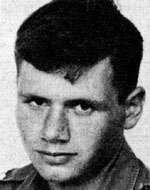Son of Yehuda and Miriam. He was born on Sunday, March 22, 1947. His father was a renowned chemist and a veteran “Haganah” and his mother was a pharmacist, and when Oded was born, the father was very ill, but the boy’s arrival filled the short days of encouragement and the house was Full of light and joy, but at the age of eight he was encouraged by his father, and even though he was soft in the years, he went to the aid of his mother, who helped to manage the household, In Jerusalem, he was very talented and absorbed human and scientific subjects with ease and curiosity, and he loved others with himself, but not with his friend, who would show them his kindness. Oded loved to argue and was not afraid to express his views in any forum, he listened attentively to the views of his ideological opponents, but he had never insulted any of them and was cautious With all his respect, Oded hugged the whole world with his love and always stayed close to his family, and he loved his mother with all his soul, spoiled her and presented her with gifts on family holidays and even when he was in the army he made efforts to get home for only a few hours. His brother Amos was also attached to every fiber of his soul, used to tell about his personal achievements and was proud of him and his studies in medicine. When he came home he would talk to Grandpa and Grandpa despite the linguistic difficulties and entertain his little cousins. From the seventh grade he studied at the Hebrew University High School. Here, too, he did well in his studies. He read books throughout the territories and spread his wings over subjects that were not included in the curriculum. He showed serious interest, for example, in questions of philosophy and politics. Was one of the pillars of the Scouts movement, organized debate evenings, lectures, and plays. Most of his activities (reading books, activity among the Youth for Youth movement, work within the Scouts, etc.) his educator complained that he was abandoning his studies somewhat, but his mother answered him that she could not dictate his way of life. Oded was a zealot for the Hebrew language and was careful to use it correctly. He often wrote to the Academy of the Hebrew Language and offered suggestions on the use of Hebrew words instead of foreign languages. Nor did he recoil from correcting linguistic errors in his interlocutors. He loved his city of birth in Jerusalem. He knew its alleys, its various types, and often felt real longing for the city. In July 1965 he was drafted into the IDF, served in the Nahal Brigade and was attached to the “Golan” nucleus in Tel Katzir. A few days before the outbreak of the Six-Day War, he wrote home: “How lucky I was to improve my strength! Otherwise, I was at the rear … “He was a lover of peace by nature and believed that it was possible and possible to live in peace with our neighbors, among others he became an amateur photographer and in this hobby he perpetuated a series of events and functions, His course in Tel-Katzir, the course of a squad commander, a course in sniping and a course of contact – and even many trips throughout the country during his short vacations together with his girlfriend. More than anything he tended to take pictures of the landscape and countless times immortalized the view of the southern Negev and its ancient splendor. A few months before he was about to be released, he decided to continue his studies and chose physical chemistry. His mother enrolled him at a Tel Aviv university because Oded was at the time facing the enemy for three weeks and the days of alert and tension of the Six-Day War. He was in compulsory service, and yet he was the manager of a lively correspondence, not only with a familyHis friend and friends, but also with the bookstore “Ahiever” where he wrote: “I was and I do not see an end to this matter and I fear that I will miss the ‘Book Week’ I want to keep the following books for me” – and he lists various books such as Aristophanes, ‘Moshe’ to Martin Buber and so on. This proves how thirsty the young man was. The battle went with the first wave and the commander said that even in the first row, although he did not have to go out with the first, because the role assigned to his company was the role of the “second wave.” He was a diligent soldier who performed his duties with dedication and loyalty. On the first day of the war, he fell on the 5th of Iyar 5727 (5.6.1967). He fell in a battle that took place in Umm Kataf in Sinai. He was buried in the Military Cemetery in Jerusalem. Despite his natural youth, he encouraged his signature in his ideology to a group of friends who published a pamphlet in his memory containing his literary legacy. An intelligence tribe of the Scouts movement published a pamphlet in memory of its members who fell in the battle. The “Six Day War” group was commemorated. In his booklet “Hand for the Fallen” issued by his company, his name was immortalized. The “Golan” nucleus in Tel Katzir and his friends published a pamphlet named after him. His name was also commemorated in Nahal-Negev in the campaign. In the book “Bimkomim”, published by the Union of Kibbutzim and Kibbutzim in memory of the fallen members of the European Union, several pages are dedicated to his history and part of his estate. Even in the collection of the estates of the sons who fell in the Israeli army – “Goily Ash”, Volume 4 – was brought from his estate.
